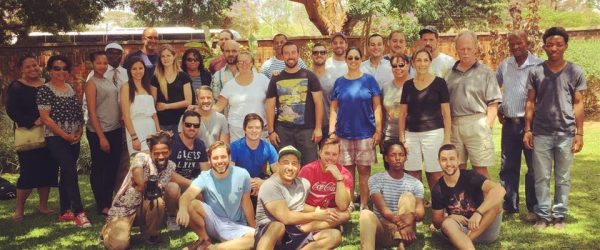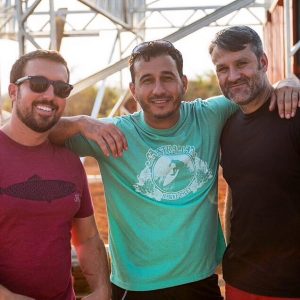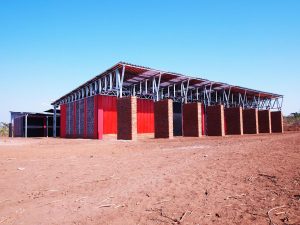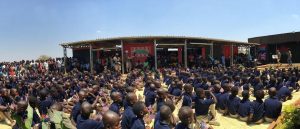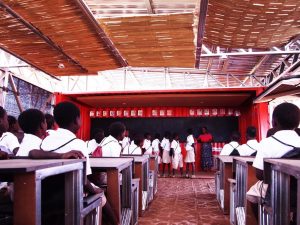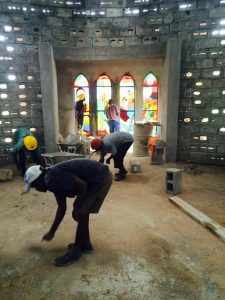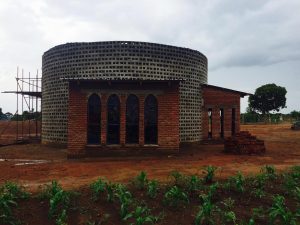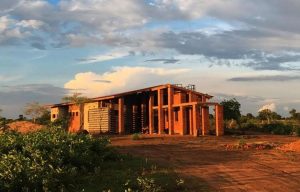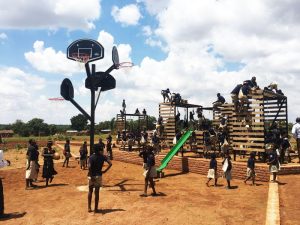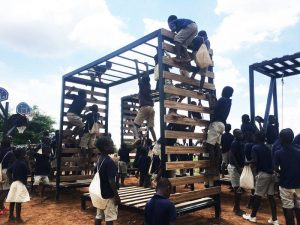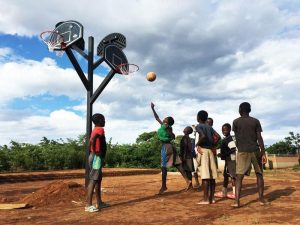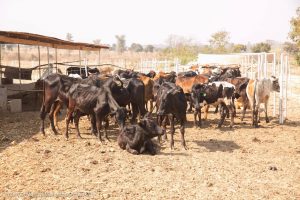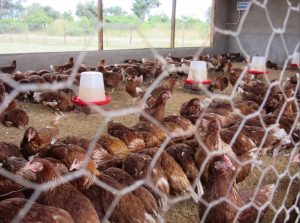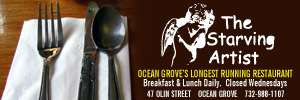Asbury Park Residents Build A Village Across The Globe
Madonna tribute Event Feb 24 at House of Independents To Support Local Youth of Malawi Nonprofit
In 2009, Asbury Park resident Jon Biondo and two friends embarked on a trip to the Sub-Saharan African nation of Malawi. A former British colony, one million of the the landlocked nation’s population are children orphaned by the HIV/AIDS pandemic.
Biondo, then practicing law in New York, was fulfilling the wish of a long time client who had willed money to children in Africa. With no personal connection to the nation, Biondo, Ryan Coutu, a paralegal, and Timothy Horman, also an attorney, [all shown at right] landed in the remote rural community of Chimphamba, a village with little access to medication, clean water, proper nutrition, sanitation. Education was a luxury.
Upon their return, Biondo and his friends launched Youth of Malawi, a 501(c)(3) nonprofit and in the 8 years since, they have spearheaded fundraisers and mission trips that have helped transform a community more than 7,000 miles away.
On Feb. 24, Youth of Malawi, in conjunction with the Asbury Park Social Club, will host a Madonna tribute fundraising event, complete with a 7 p.m. advanced screening of ‘Strike A Pose’ – the award winning documentary featuring the ‘Material Girl’s’ tour dancers and their struggles with HIV at The House of Independents on Cookman Avenue. Held in conjunction with the Asbury Park Social Club, there will be raffles featuring prizes from local venues and a brief introduction film outlining Youth of Malawi’s charge and its planned 2018 mission trip. At 10 p.m., an ‘Express Yourself’ dance party featuring DJ Valentine kicks off. The tickets are $20 in advance, $25 at the door.
Below are four Sun interviews with volunteers and organizers, beginning with Biondo:
Sun: When was Youth of Malawi founded and by whom?
Biondo: Youth of Malawi was founded in 2009 by Jon Biondo, Ryan Coutu and Timothy Horman in New York, NY, after a trip to Malawi where we met orphans at the Home of Hope Orphanage. The orphans there are mostly orphaned from parents who succumbed to AIDS. The children there had never had any field trips, so we vowed to return to Malawi the next year with money to take 300 of them on a field trip to Lake Malawi, where they could swim and play for the first time. Lake Malawi is the third largest lake in Africa and is beautiful. Most Malawians have never seen it as they do not have money to travel there. We returned and took the 300 kids, on buses, to the beach. We provided t-shirts, bathing suits, sunglasses, beach games and toys, and we had a two day trip that was amazing. These kids, now teenagers talk about the trip as the most amazing day of their lives. In the 8 years that have followed the founding of the charity we have built a primary school, a hospital, a playground, a church, a library, housing for teachers, a professional soccer field, a monument to a national hero, created adult literacy programs, employed dozens of people and transformed a poor rural village in the poorest district of the poorest country on earth.
Sun: What is Youth of Malawi’s mission?
Biondo: The mission of Youth of Malawi is to assist the most vulnerable children on earth, the rural poor of western Malawi, with the essentials they need to prosper in life. We have eliminated a 4-mile walk to school that most of our villager’s faced, we have provided irrigation and water drinking points and wells at 10 locations, created rain water harvesting roofs, solar panels on every building and brought light, energy and literacy to a village of 1000 people.
Sun: Why choose to build the playground and school in Malawi?
Biondo: Malawi is the poorest country in the world. It is a nation with over 1 million orphans from HIV and AIDS. It is quite common for these children to have 3-4 mile walks to school every day and this distance and the dangers encountered during these walks are the reason many don’t attend at all. We engaged a South African architecture firm to build school buildings out of used shipping containers using local labor. The school is now attended by over 400 students. We built the playground because we believe that emotional health is essential to the proper development of human beings and offering leisure time and architectural beauty to young people creates a positive nurturing environment in which they are more incentivized to attend school and learn. We also gave them a music program, an arts and crafts initiative, and built an outdoor movie theater to enjoy cartoons.
Sun: When is the next mission?
Biondo: The next mission is in October, 2018. Volunteers pay their own way, and are required to raise $500 for our organization in order to come. The trip is a week of volunteering to build an additional classroom at the same village, and then a week of vacation somewhere in Africa. The trip ranges in price from $3, to $5,000 depending on the vacation portion. Some will choose a safari, some will go to Lake Malawi, and some may go to Cape Town or Johannesburg.
Sun: How long has the Asbury Park Social Club been in existence?
Biondo: The Asbury Park Social Club was founded about a year and a half ago and has blossomed into 850 active members. It was created as a reaction to the closure of Cameo, one of the three gay bars in town. We founded it to encourage our LGBTQ friends to patronize all venues in Asbury Park, gay and straight, so that we would not be limited to the two remaining gay bars, which, while wonderful, don’t provide the breadth of experience that all Asbury citizens enjoy. So as to not miss out, we formed the group so that en masse, we could feel comfortable everywhere. We’ve had trivia nights at Kim Marie’s and the Asbury Festhalle & Biergarten, a lumberjack themed costume event at Johnny Mac’s, dances at The Asbury, and meet-ups at restaurants, theaters, and other venues. We also explore the world outside AP. We’ve done hiking, biking and rafting trips in the water gap, a ski trip to Stowe Vermont, and organized a Christmas tree lighting and caroling event benefiting the [local] Boys and Girls Club.
Sun: What is its mission?
Biondo: The mission as described above is inclusion. Inclusion of LGBTS allies into our events, but also inclusion of LGBTQ people of Asbury into all of the venues and events the city has. Now, more than ever, we need to stick together in the face of looming renewed persecution.
Below find the Sun’s interview with mission volunteer Hillary Kindman, a therapist who has lived in Asbury Park for three years:
Sun: How did you get involved with Youth of Malawi?
Kindman: Two years ago, I went to a backyard barbecue benefit with a friend. I didn’t know the guys but their story was overwhelming. For me, going to Africa was bucket list item, so three of us signed up together. We did a safari before meeting up with everyone in Malawi.
Sun: Was the fundraising aspect difficult?
Kindman: A lot of people in my life were very happy to donate whatever they could, clothes, anything. I’m grateful for what they have done and selfishly grateful for the connections I’ve been able to make through Youth of Malawi.
Sun: Will you do it again?
Kindman: Yes, I think a lot of foreign aid will probably begin to diminish so to have an organization like Youth of Malawi that is not only locally based, but forward thinking, is great. On one of their projects, they hired a photographer to take pictures of everyone in the village. Now you and I live in the west, so we have mirrors and can see ourselves anytime, but kids would grab the photographer’s arm so they could see themselves. In the end, as we were handing out new school uniforms, the guys were handing out the photos under a tree in the yard, and although the men were initially a little reserved, they made their way to the gathering under the tree.
Sun: What was your overall experience with Youth of Malawi?
Kindman: They are amazing, they are meticulous in everything that they do but they don’t impart their beliefs on the village. They have collected studies to determine what the village wants. Because of them the cases of ringworm and runny noses have vastly diminish. They brought in fresh water and chickens, and are setting up micro loans to help villagers become more self-sufficient. When the villagers pay back the loan, it goes back right back into a fund for the village. They are not doing this for any kind of monetary gain.
Sun: What were some of your fondest moments from the mission trip?
Kindman: When we first got there, the kids came right up to the bus singing ‘We are happy today.” As we exited the bus, you literally were walking into a sea of people. They wanted to touch you and you want to touch them. We planted 150 fruit bearing trees and put stones around them to protect them from the goats and we distributed eggs from the chickens to homes in the area.
Sun: What did you take away from the experience?
Kindman: Selfishly, I thought I had the life lesson – to be kind to others; treat people well, but coming back, I realized the daily [frustrations] are so unimportant….When I tell you the villagers had nothing – they had nothing, but they opened their arms to us because these guys have consistently gone back. They trust us because they trust Youth of Malawi. The experience gave me a new appreciation, not only for my life and the people I love, but it makes you more tolerant.
Below is the Sun’s interview with Co Founder Ryan Coutu, a paralegal and Asbury Park resident who studied Sustainable Development at Columbia University:
Sun: Can you recall how you felt following that first trip?
Coutu: You can’t unsee what we saw. There was no way we could write that last check and wash our hands of it. We’re lucky because we a lot of spare time and access to a lot resources.
Sun: Is it difficult to find volunteers willing to commit to a mission trip like this?
Coutu: We are so lucky that the residents in Asbury Park have come on board with us. A trip like this can sound cool on the surface but when people begin to hear more details about what we do and the level of change we are bringing to the community over there, you can see the thought process in their expressions. It takes a little convincing because you are bringing someone out of their comfort zone. And, when they make the decision to this, it is somewhat of a roller coaster of emotions. There is a psychological toll when one is exposed to this level of poverty. That’s why the vacation part of this is so important. It gives people a chance to decompress before jumping back into their daily lives and for us, a lot of great ideas are sparked and connections are made. It’s a really cool time of reflection and critical thinking.
Sun: How many people went on the Oct. 2016 mission trip?
Coutu: We had 35 people, 10 from Asbury Park, and the rest from the tri-state area and Canada. There were also four architectural students from the University of Johannesburg who won a design competition. Their professor folded our design challenge into his curriculum. They had to create a completely sustainable and functional building from raw materials.
Sun: Tell me about the school?
Coutu: It’s made of two used shipping containers. We had the help of three architects from Johannesburg, and volunteers from England and Dubai. We named the school after Legson Kayira, a famous Malawian and New York Times bestselling author because we were inspired by his quest for education. We got permission from his family [four children] who came to the dedication ceremony. [Legson Kayira’s ashes are interned at the school at the bequest of the family].
Sun: How many trips have you made to Malawi
Coutu: This [the 2018 mission trip] will be our seventh. We have done three mission trips with volunteers. During the other visits, we are taking care of the administrative details and planning with the architectural team and the community. We hold community meetings to determine what they want and what are their needs. From a first world perspective, we look to what it is they need, use a minimum carbon footprint to develop it with minimum overhead in order to make every dollar effective. We hire local workers and once the project is underway, that’s when the larger group goes in. For safety reason, they are really focusing on the finishing touches, like landscaping, painting, or putting furniture together.
Sun: How has your mindset changed through this journey
Coutu: This is not really something I chose to do, this really chose me. The experience is something that really cannot be compared, something you don’t really get to feel when your are here in our bubble. The people of Malawi are way more than friends now.
And lastly, the Sun’s interview with part time city resident Michael Buonaguro, a project manager at a New York international banking firm:
Sun: How did you become involved with Youth of Malawi?
Buonaguro: The opportunity to travel with the group came about last year. I knew automatically it was something that I wanted to do. Few people could muster up the people and funds that they have in order to make a change for 1,000 people in a village thousands of miles away – it was pretty inspiring.
Sun: Did you have any anticipation going into the journey?
Buonaguro: I didn’t know what to expect. I’d seen a few photos, spoke with them about the trip prior, but coming from the west, I don’t think anything can prepare you for what the village and hundreds of villages are going through. There’s a lack of water, food, and basic medical equipment. People were sent to clinics miles outside of a village only to find out that there weren’t any medical supplies when they arrived.
Sun: What was the most unexpected part of the experience?
Buonaguro: This is a nation of 17 million people who share 20,000 cars so you can imagine the astonishment in the streets seeing our bus. Also, the sense of family, community, pride, and happiness was overwhelming. When you take away all the material things we have, these people are prime examples of living their lives to the best of their ability. Despite a lack of education, any chance of upward mobility or any governmental assistance to help them get by, they still manage to be warm and kindhearted.
Sun: What did you take away from the experience?
Buonaguro: I can’t tell you how much there’s been an uptick to my charitable involvement and donations. It just gives you a greater sense of perspective in terms of where you are, the help of your family and friends, educational access, and healthcare. It changes your mindset.
Sun: Will you return?
Buonaguro: Yes, I’d like to see the progress on the clinic and to see how the students are doing. I’ve traveled to Spain, Italy, lived in London and went to Morocco but this was my first time in southern Africa. We went into homes that were lucky to have a metal roof, the rooms were bare; there were no shelves, bowls or even a a place to sit. Here $750,000 can buy a decent home, but there it can supply a village of 1,000 with opportunity and healthcare.
[For more information, visit Youth of Malawi’s website and Facebook pages.
———————————————————————–
Follow the Asbury Park Sun on Facebook, Twitter and Instagram.
The Asbury Park Sun is affiliated with the triCityNews newspaper.

